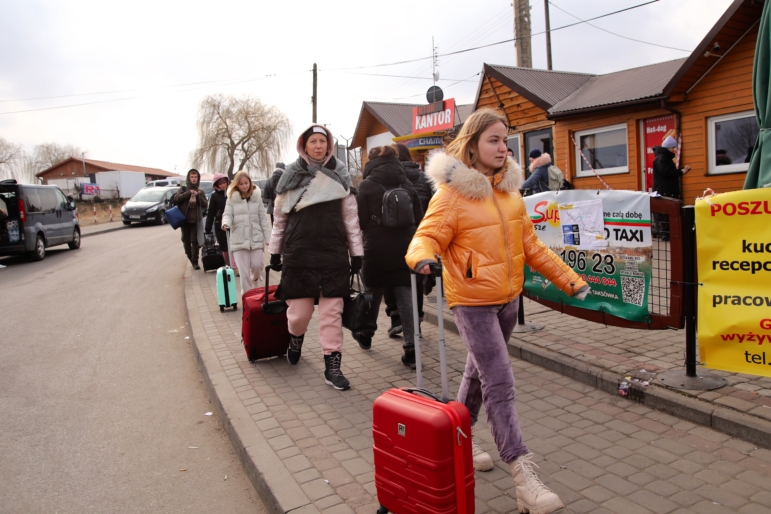[ad_1]
In her recent address before the United Nations Security Council, the Special Representative on Sexual Violence in Conflict Pramila Patten delivered a searing account of the devastating and shocking use of rape as a weapon of war. Sexual violence and exploitation, she warned, continues to be used as a tactic of terror, inflicting long-term suffering upon survivors and their families.
The list of countries in which women and girls are systematically raped, sexually exploited or considered spoils of war or political repression is shockingly long. From Bosnia to Haiti, from Iraq to the Sudan, it appears we have learned nothing in preventing sexual violence in conflict and post-conflict settings. Justice for the survivors remains rare.
Today, the methodical sexual assault, gang rape, torture, and sex trafficking of women and girls are deployed as military strategies in the Tigray region, Syria, Myanmar and, now, in Ukraine. Reports of Russian soldiers and other paramilitary operatives raping and murdering Ukrainian women and girls in their homes or as they flee the war are increasing.
Since the Russian invasion began in February, over five million Ukrainians, mostly women and children, have fled the country, seeking refuge across Europe and beyond. While many countries are welcoming the refugees with needed relief, other dangers await them. By mid-March, news emerged from Poland of pimps at the borders waiting for the desperate and disoriented Ukrainian women, offering them transport, work or accommodation. In the chaos and confusion at train stations and other hubs, it is all too easy for exploiters to seamlessly blend into the crowds of well-intentioned people offering legitimate aid.
In Berlin, pimps and traffickers dressed in orange vests, generally worn by refugee assistance personnel, held signs stating: ‘You can live with me.” In the UK, the government-sponsored “Homes for Ukraine” program was dubbed “Tinder for sex traffickers” when reports surfaced of men offering Ukrainian women a place to stay in exchange for sex. The UN refugee agency formally requested that the British government stop pairing single men with Ukrainian refugee women.
This instant mobilization of traffickers and brothel managers is a direct consequence of the vibrant and growing market for the purchase of sexual acts, and the quasi-lack of impunity for those doing the buying. Germany, for example, is a prime location for these exploiters, as well as a case study of what is needed to prevent such heinous crimes. Contravening international law, Germany legalized prostitution in 2002, leading to an explosion of the sex trade, with an estimated 1.2 million men now purchasing sexual acts every day. With this extraordinary level of male demand for prostitution comes a required “fresh supply” of women furnished through sex trafficking.
Online, sex buyers are monitoring the news and asking their local brothels when Ukrainian women will arrive. On social media, a German group posted an invitation to incoming Ukrainians announcing that the sex trade was legal in Germany and that “…If you know someone who needs support info on how to begin sex work in Germany, we can help.” When the message sparked outrage, the group denied that they were recruiting refugees and instead were merely facilitating consultations for those wishing to enter prostitution in Germany since “It is very common for people to begin sex work during a time of financial precariousness; this includes people fleeing war.” Precisely.
In other cases, brothel owners, like a well-known one in neighboring Austria, where prostitution is also legalized, are hailing the inflow of Ukrainian refugees as an opportunity, marketing their establishments in which violence, degradation, and even murder occur, as welcoming shelters with private bathrooms.
To counteract these brazen recruitment efforts into the sex trade, certain groups, including women-run shelters, are issuing warnings to women at the borders, sharing numbers for national hotlines, and calling for government-led registries of refugees.
But governments cannot only rely on the warnings from the UN or the efforts of small local organizations. One of the most achievable solutions in preventing sex trafficking is to end the impunity for those who create the demand for the commercial sex market in the first place. Accountability must not be limited to the traffickers and profiteers of the sex trade; it must extend to the sex buyers themselves.
Last month, Sweden, which was the first country to enact a law that targets sex buyers as perpetrators of sexual violence and discrimination, arrested 38 men, 30 of whom had purchased Ukrainian refugees lured into local brothels. The time is now for Germany, Austria, and other jurisdictions that view sex buying as culturally accepted male behavior instead of sexual misconduct, to follow suit.
The United Nations has vowed to implement its ten resolutions related to women, peace and security, five of which focus specifically on sexual violence in conflict. They must also continue to urge states to follow international law and adopt legislation that prevents sex trafficking, holds perpetrators accountable, and supports survivors until they can rebuild their traumatized lives. The tools to reach these goals are available to us. What we need is the political will to recognize that weaponizing women and girls as fodder for war and for brothels must no longer be accepted as inevitable.
About the Author: Taina Bien-Aimé is the Executive Director of the Coalition Against Trafficking in Women (CATW).
[ad_2]













Hi there Dear, are you genuinely visiting this site on a regular basis, if so after that you will absolutely get fastidious knowledge.